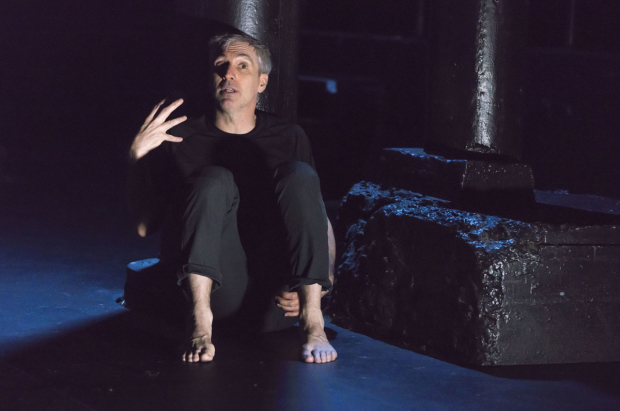Cry Havoc!

(© Ashley Garrett)
"Cry 'Havoc!', and let slip the dogs of war." It's Mark Antony's famous line in Act 3 of Julius Caesar in which he privately plots revenge against Caesar's assassins over the fallen man's corpse. It doesn't take much digging to find the unleashing of war throughout Shakespeare's repertoire — Richard III, Coriolanus, and Troilus and Cressida join Julius Caesar on the list, just to name a few. But the slightly less apparent theme in Shakespeare's work that Bedlam's Stephan Wolfert assiduously highlights in his solo show Cry Havoc! (now at the New Ohio Theatre) is the reintegration of the soldiers after they return from these gruesome battles. In short, Shakespeare is one of literature's greatest interpreters of the veteran experience. Who knew?
Wolfert himself made this discovery after stumbling upon a Montana production of Richard III following his six-year service in the U.S. Army. He weaves between his own story and excerpts from Shakespeare's famous speeches that provide incisive parallels. In fresh context, they capture the experience of veterans who, in Wolfert's words, have been "wired for war but not unwired from war."
Whether it's Hamlet's "To be or not to be" speech as a symbol of veterans' all-too-frequent suicidal thoughts or Lady Percy's speech to her husband in Henry IV about his night terrors brought on by images of battle — Shakespeare is surprisingly spot-on in his presentation of the veteran experience, and Wolfert is similarly spot-on in his performance. He's a convivial host when talking with his audience one-on-one and morphs into a seasoned Shakespearean actor who interprets the dense language with a clear voice and intent (Les Dickert's lighting design helps us toggle between these two modes).
Cry Havoc! is a piece with theatrical roots, and Shakespeare aficionados will certainly appreciate the angle of interpretation that Wolfert presents. But he and his director, Eric Tucker, have created a play whose purpose distinctly veers from the artistic and toward the edifying — Wolfert's work teaching Shakespeare to vets as a form of therapy is the greatest proof of that. While this is a valid use of theater, patrons should know going in that they're more likely to receive a masterful TED Talk about the psychological ramifications of war than a crafted work of art.
This intent fully comes to light in the second act, which is actually more akin to a performance talkback with an opt-out system. The audience circles the stage for a group discussion about society's relationship to veterans, and if you're lucky, you'll have some vets in your audience willing to share their own feelings on the subject. Considering the glaring (and perpetual) absence of support for American troops returning home from war, it's an important conversation for anyone to have — regardless of personal military history or political affiliation. But veterans particularly will find an invaluable resource in Cry Havoc! and a sincere ally in Wolfert. As he often repeats, conversation is the first step to "purging the poison" from topics that are usually kept hush-hush. Just know going in that you won't only be watching someone else purge their poison — you'll be asked to purge some of your own .











